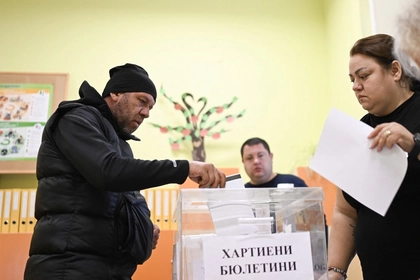Bulgaria is headed for an eighth general election in just four years as the country continues to grapple with a severe political crisis, with Boyko Borissov (EPP), leader of the largest party GERB, announcing on Tuesday that he did not want to become prime minister and "take care of this broken country".
He announced that GERB would not agree to the government options proposed by other political parties as they refuse to have their leader, Borissov, as prime minister.
JOIN US ON TELEGRAM
Follow our coverage of the war on the @Kyivpost_official.
"I am relieved to withdraw my declaration that I will be prime minister. There is no fixing this chaos and this mud (in Bulgaria)," Borissov said in his typical style on Tuesday.
The GERB leader served as the country's prime minister from 2009 to 2021, but the corruption scandals that erupted during his rule made him a difficult political partner.
Borissov is known to quickly change his mind about the government, but for now, there seems to be no prospect of loosening the dead political grip in the Bulgarian parliament.
The second political force is the pro-European liberal coalition We Continue the Change - Democratic Bulgaria (PP-DB), which insists that Borissov should abandon his prime ministerial ambitions and declare that he will help politically isolate MP Delyan Peevski, who has been sanctioned by the US and Britain for corruption.
Borissov refuses to sign the political documents proposed by the PP-DB, which include blocking the election of the prosecutor general and continuing the reform of the judiciary.

Conservatives top Bulgarian Elections But Fall Short of Majority
The misunderstanding between the two largest formations has blocked parliament's work for a month since the last elections, and no talks to form a government have effectively taken place.
On Monday, Borissov proposed that he be elected prime minister while the PP-DB would be given the post of parliamentary speaker. Borissov said that if this happened, he would certainly succeed in bringing Bulgaria into the eurozone.
The offer was rejected because Borissov did not agree to isolate Peevski and his MRF-New Beginning party, which was accused of large-scale illegal vote-buying in the last elections.
"Let's respect the people's vote. We are giving them a solution to get out of the crisis, but PP-DB wants to deepen it," Borissov said.
In response, PP-DB co-chairman and former prime minister Kiril Petkov accused Borissov of choosing between Bulgaria and Peevski.
"Dependence in politics has turned out to be the biggest vice. Being side by side with free people is a privilege. We continue to work towards the dream of the rule of law," Petkov said.
The PP-DB accuses Borissov of working for years to increase Peevski's power unofficially. Political opponents suspect Peevski of establishing shadowy control over the special services, the prosecutor's office, and the courts.
Three years ago, these suspicions intensified after Peevski was sanctioned by the US under the Magnitsky Act for corruption and then by the UK for similar reasons.
This did not affect Peevski’s political career, who in August (2024) succeeded in splitting one of Bulgaria's oldest parties, MRF (ALDE), to form an alternative party, MRF-New Beginning, which became the fourth parliamentary force with 11.5%of the vote.
See the original here.
You can also highlight the text and press Ctrl + Enter






